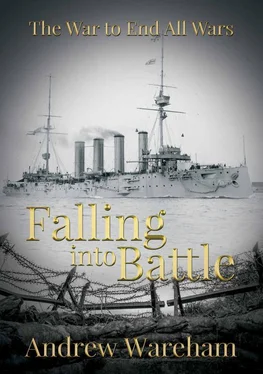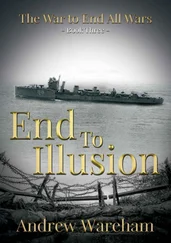“Heads down, lads.”
The survivors of the platoons ducked down behind the railway embankment, more than ten feet high, running behind the village and well above flood level, a spur line from the colliery to the main tracks, curving away to the west before turning north.
There was a series of explosions in the abandoned village as the German field guns searched out the soldiers they had seen run into cover there. Richard hoped they had not observed his people to come out of the back of the houses and crawl through the gardens and up and over the tracks into firing positions.
“What do they do next, Sergeant Grace?”
“They would have to try a battalion or more of infantry, sir, if they want us out of the village. They would have to come down the hill and then cross the canal, which won’t be easy, if they attack from the front. If it’s not on their line of march, they’ll likely not want to come this way and waste a day or more on mopping us up. More like they’ll send them Uhlans along to the next bridge and then bring them down from our right, sir, provided they don’t get stopped by the rest of the company. Going to our left, to the west, will take them away from their foot, sir, leave them exposed to rifle fire. Either cavalry or infantry face too big a risk of getting tied up and taking losses if they come at us. So, I reckon they’ll try to drive us out of the village with gunfire and leave us to withdraw, broken, without them having to go to any more bother.”
Richard hoped the experienced sergeant was right – he had had enough of this particular action.
“That suggests Captain Platt might have difficulty in meeting up with us.”
“Very likely, sir. Dark soon, sir. Might be, he’ll pull back south and then keep south of the stream till it joins the canal header pond and then work his way towards us. Might not be here till midnight, sir, unless he can pick up a clear lane joining up to the towpath.”
“Best thing we can do is feed the men and get some sleep, Sergeant Grace. Can’t imagine the Germans will attack in the night, not with having to pick their way across the rubble of the bridge.”
Both men accepted that they could not pull back from the village; they must wait for Captain Platt to have a reasonable chance of joining up with them.
“What about the railway lines, Sergeant Grace? Should we leave them intact?”
“Didn’t ought to, sir. Might be we should blow up the pitheads as well, but I don’t know how to. Don’t think there’s enough black powder, anyway.”
“Don’t know how to sabotage a railway line…”
Richard raised his head, called to the half-company.
“Were any of you railwaymen?”
Corporal Abbott answered that the railway companies had been exempted – none of their men had been permitted to join the Territorials.
“Too important if there was a war, sir. They’d have to join the railway battalions if they wanted to do service.”
“Forget about destroying the tracks, Sergeant Grace.”
They settled down, half the men sleeping while the remainder cooked up a meal and kept watch.
“Spuds and bully, sir. There was potatoes in some of the back gardens, sir.”
It was filling, and new potatoes were tasty enough.
“Movement, sir. Along the towpath. Just in sight.”
“Sergeant Grace!”
The men were woken and dispersed to their arranged places along the perimeter of their bivouac.
Richard strained his eyes but could see nothing other than that there were men moving slowly through the night towards them.
“Make ready. Wait my command.”
The whisper passed from man to man. Richard hoped the order was not too much corrupted when it reached the end of the chain. He had played Chinese Whispers as a boy, knew the changes that could happen to a message hurriedly sent along a line.
The sentry called a little louder.
“They ain’t got them funny hats, sir.”
The men had been amused by the spiked helmets worn by the German troops.
“Have they got tin hats?”
British troops had not been issued protective headgear.
“No, sir. Don’t look like it.”
“Call the challenge.”
“Who goes there?”
There was a yell of ‘friend’, followed by Captain Platt giving his name.
“Come on in, sir. Stand down, Sergeant Grace.”
The remainder of the company walked in, tired and fourteen strong.
“Get a cookfire going, Sergeant Grace.”
The fires were down low, concealed fairly much in the scrub at the base of the embankment.
“Lost twenty-five men, all told. Ten of them walking wounded and going back, if they can walk faster than Fritz. A full division of Germans heading south on the road we came up – horse, foot and guns. Lost contact with the rest of the battalion – they fell back to the southeast, I think, those that survived. I saw prisoners taken, quite a few being marched away.”
“Leaves us on our own, sir.”
“Exactly. Head towards the coast. Southwest, as soon as we have rested the men. They must have some sleep. March out at four o’clock.”
“Yes, sir. Where to, sir?”
“Follow the railway line until we come to a road. Hard marching on the tracks. Sleepers are the wrong distance apart, especially in the dark.”
“The road through the village crosses about fifty yards from here, sir. Seems to be going more south than west, but it’s empty. We blew the bridge over the canal. They had black powder at the colliery head, sir.”
“Well done. We can use the road until we come to a crossroads. Get some food in and sleep, I think. Haven’t eaten all day.”
“Sergeant Grace!”
“Heating up the bully beef stew we had, sir. Was going to keep it for breakfast but they can eat it in a few minutes and I’ll get the boiling pots on again for the morning for all of us.”
“Pulling out for four o’clock.”
“Can be done, sir.”
Captain Platt was close to exhaustion.
“Lost my Sergeant Brewer and both corporals mid-afternoon. They set up a machine gun enfilading us down by the stream. Lucky to get anybody away. Fired off almost everything in the pouches, keeping them off our backs.”
“We are well off for rounds, sir.”
“I doubt my men have more than is in their rifles just now, Baker.”
“I issued one hundred and twenty to my half company, sir. We can share some of that.”
“Wise. I shall know better next time. Is that a plate of food I see?”
Captain Platt ate and belched and rubbed his stomach as indigestion pained him and almost fell down as the fatigue hit. He was asleep within the minute of being led to a blanket under the cover of a bramble bush.
They marched out before dawn, finding the road and turning south. Thirty minutes brought them to a crossroads, unsigned. The road west seemed to take a northerly angle in the near distance.
“South goes uphill, sir.”
“Right, Baker, up we go, find cover and wait for full daylight.”
The hilltop was lower than their battlefield and completely open, sandy and uncultivated. It gave a view of the immediate area, showing a countryside of low hills and shallow valleys, the watered areas divided into more of the small fields, hedged and ditched and difficult to traverse. They spotted detachments of cavalry in the narrow lanes to the east and battalions of infantry pressing south across the fields. The wider roads all had wagons and artillery in convoys, well separated from each other, under a rigorous discipline. None of the troops were heading west towards them.
“An Army Corps, at least, Baker. It might be the right wing of one of Schlieffen’s columns.”
Captain Platt outlined the Schlieffen Plan, known to the regulars, at least vaguely, but never explained to the Territorials, who had hardly needed an understanding of high strategy.
Читать дальше












